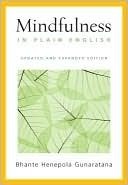More on this book
Community
Kindle Notes & Highlights
dukkha, and it does not just mean the agony of the body. It means that deep, subtle sense of dissatisfaction that is a part of every mind moment and that results directly from the mental treadmill.
The consequences of a purified mind will follow you like your own shadow. No one can do more for you than your own purified mind — no parent, no relative, no friend, no one. A well-disciplined mind brings happiness.”
Patience is the key. Patience. If you learn nothing else from meditation, you will learn patience. Patience is essential for any profound change.
electron is an event more than a thing, and the observer participates in that event by the very act of his or her observation. There is no way to avoid this interaction. Eastern science has recognized this basic principle for a very long time.
Let the meditation move along at its own speed and in its own direction.
Don’t condemn yourself for having human flaws and failings.
View all problems as challenges.
Don’t ponder. You don’t need to figure everything out.
Habitual deliberation is not necessary to eliminate those things that are keeping you in bondage.
We compare our looks with others, our success, accomplishments, wealth, possessions, or IQ, and all of this leads to the same state — estrangement, barriers between people, and ill feeling.
As our insight becomes sharpened, we become more and more aware of the fact that all aggregates, mental and physical, are cooperating, and that none can exist without the others.
What are the things we do not like? We do not like to detach ourselves from loved ones or to live with unloved ones. We include not only people, places, and material things into our likes and dislikes, but opinions, ideas, beliefs, and decisions as well. We do not like what naturally happens to us. We do not like, for instance, growing old, becoming sick, becoming weak, or showing our age, for we have a great desire to preserve our appearance. We do not like it when someone points out our faults, for we take great pride in ourselves. We do not like someone to be wiser than we are, for we are
...more
If we do not, for instance, have the root of hatred, nobody can make us angry,
The other person is our mirror in which we see our faults with wisdom.
it is by knowing the existence of our deficiencies that we can improve ourselves.
Both pointing out shortcomings and responding to someone pointing out our own shortcomings should be done mindfully.
It is not the vipassana meditator’s goal to become enlightened before other people or to have more power or make more profit than others.
Our goal is to reach the perfection of all the noble and wholesome qualities latent in our subconscious mind. This goal has five elements to it: purification of mind, overcoming sorrow and lamentation, overcoming pain and grief, treading the right path leading to attainment of eternal peace, and attaining happiness by following that path.
If you have never meditated before, sit motionlessly for not longer than twenty minutes.
Once your mind is focused on the breath, give up counting.
All you should notice in all these occurrences is the impermanent, unsatisfactory, and selfless nature of all your experiences whether mental or physical.
As your mindfulness develops, your resentment for the change, your dislike for the unpleasant experiences, your greed for the pleasant experiences, and the notion of selfhood will be replaced by the deeper awareness of impermanence, unsatisfactoriness, and selflessness.
When the mind is united with the breath flowing all the time, we will naturally be able to focus the mind on the present moment.
even a small degree of desire for permanence in an impermanent situation causes pain or unhappiness.
This does not mean, however, that you should be sitting there having little conversations with yourself inside your head:
Ignorance may be bliss, but it does not lead to liberation.
Sinking mind is a void. Avoid it.
perhaps weeks or months
They are temporary, and they will end when the meditation ends.
The process itself is fascinating and fulfilling. It can be enjoyed for its own sake. There is no need to rush.
It should also be a place where you won’t feel on display.
You will probably find it helpful to sit in the same place each time.
First thing in the morning is a great time to meditate.
Wash your face, or shower before you begin.
Make meditation the first major thing you do in the morning.
We recommend that after a year or so of steady practice you should be sitting comfortably for an hour at a time.
just deter mine what is a comfortable length of time for you at this point in your life. Then sit five minutes longer than that.
THERAVADA BUDDHIST countries, it is traditional to begin each meditation session with the recitation of a certain set of formulas.
psychological cleansing devices that require active mental participation in order to be effective.
“I am about to tread the very same path that has been walked by the Buddha and by his great and holy disciples. An indolent person cannot follow that path. May my energy prevail. May I succeed.”
egoless awareness.
Behavior includes your thought,


